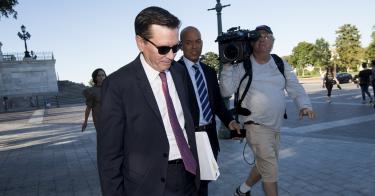President Donald Trump last week fired Michael Atkinson, the inspector general for the nation’s intelligence community.
Atkinson made headlines last year when he told Congress about a report filed by an anonymous intelligence official who alleged that Trump inappropriately had offered Ukrainian President Volodymyr Zelenskyy foreign aid in exchange for a politically beneficial investigation into former Vice President Joe Biden and his son Hunter Biden.
That anonymous official later was identified as a CIA analyst who left the White House in 2017 after being suspected of leaks to the media.
Trump said he fired Atkinson because “he did an absolutely terrible job” handling the complaint as inspector general. Some in the news media, however, have accused the president of retaliating against Atkinson for disclosing the complaint that lead to Trump’s impeachment.
We don’t know which narrative is correct, and the concern that Atkinson’s firing was political retribution should be taken seriously. Inspectors general need to be fully independent and nonpartisan to do their jobs well. Presidents should neither expect nor require loyalty from them.
That all-important independence, however, is no shield against legitimate criticism. And Atkinson rightly has earned a great deal of criticism for his actions.
As we’ve written previously, Atkinson’s handling of the intelligence official’s report did not comply with the law or his own department’s policy.
Under federal law, a member of the intelligence community may file a complaint with the inspector general if it relates to a matter of “urgent concern.” The law defines a matter of urgent concern as a problem relating to “an intelligence activity within the responsibility of the Director of National Intelligence.”
The complaint Atkinson sent to Congress was about a diplomatic phone call, not an “intelligence activity.” It did not fall under the jurisdiction of the director of national intelligence. The Justice Department’s Office of Legal Counsel issued a memorandum explaining that point.
Thus, it did not qualify as a valid whistleblower complaint. Atkinson either failed to understand the law or decided to ignore it.
Strike one for Atkinson.
Another law states that the inspector general should refer the complaint—even if it was not a valid whistleblower complaint—to the Justice Department for investigation. Atkinson did not do that.
Strike two.
The law also requires the inspector general to determine whether the complaint is credible. At the time Atkinson received the complaint, long-standing department policy required, for good reason, that a complaint be based on firsthand information—not hearsay—to be considered credible.
That was not the case with the complaint Atkinson greenlighted. The supposed “whistleblower” was not involved in the phone call between Trump and Zelenskyy, didn’t work in the White House at the time the call was made, and clearly had a political ax to grind against Trump.
Despite all of his knowledge being thirdhand, Atkinson deemed his complaint to be credible anyway.
Strike three.
Usually with three strikes, you’re out. But Atkinson kept swinging—and missing.
When asked about how he made his credibility determination, Atkinson admitted that he never reviewed the White House memorandum describing the content of the call between Trump and Zelenskyy.
Strike four.
When the press asked Atkinson why he violated the policy, he acknowledged that the policy prohibited him from deeming the report credible, but said he changed the policy after receiving the complaint.
Strike five.
Perhaps realizing that he had backed himself into a corner, Atkinson tried to spin his way out.
He said that, regardless of what was written down, the true policy actually always had been the opposite; that is, complaints were totally fine, even if they were not based on firsthand information. And anyway, Atkinson continued, the complainant checked a box on a form that said he had firsthand information, even though the body of the complaint made it obvious he didn’t.
There are several ways to slice this, and none make Atkinson look good.
He either allowed a defunct policy to sit on the books for years, disregarded an established policy for political ends, or didn’t do his job with the care required from the inspector general of the intelligence establishment, one of the most important functions of the executive branch when it comes to the nation’s security.
Strike six.
Still, Atkinson maintains that he did his job properly and was fired for it.
He may or may not have been fired as an act of political retribution. That’s something that should not happen, because it can undermine the independence of all inspectors general.
But contrary to his claims, Atkinson did not do his job properly, and it’s understandable why Trump would lack confidence in his competence, independence, and dependability.
Our respect for the importance of the independence of inspector generals does not shield Atkinson from the criticism he rightly earned.
This piece originally appeared in The Daily Signal



